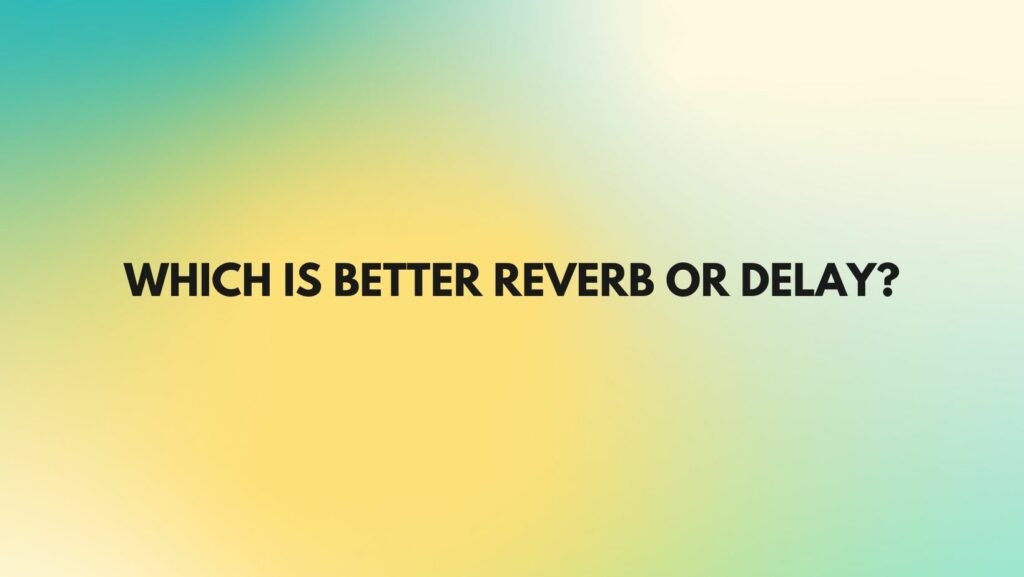Reverb and delay are two of the most iconic and versatile effects in the world of music. They both have the power to transform your sound, creating depth, texture, and character. But when it comes to choosing between reverb and delay, which is better? In this comprehensive comparison, we’ll explore the differences, applications, and unique qualities of reverb and delay effects to help you determine which one is best suited for your musical needs.
I. Reverb: A Closer Look
Reverb, short for reverberation, replicates the reflections of sound waves bouncing off surfaces, providing a sense of space and ambiance. Let’s delve into the world of reverb:
- Applications:
- Reverb is widely used for adding space, depth, and dimension to your sound.
- It can simulate natural or artificial room ambience, such as small rooms, concert halls, or cathedrals.
- Reverb can offer a wide range of tones, from subtle, transparent effects to lush and atmospheric textures, making it suitable for various musical styles.
- Creative Uses:
- Reverb pedals are incredibly versatile for creating ambient soundscapes, dreamy textures, and ethereal effects.
- Musicians in genres like ambient, shoegaze, and atmospheric rock often rely on reverb to shape their signature sound.
II. Delay: Echoes of Creativity
Delay pedals generate rhythmic echoes by repeating the sound signal with a time delay, offering an array of effects, from simple slapback to intricate patterns. Let’s explore the world of delay:
- Applications:
- Delay is known for producing rhythmic echoes, adding texture and space to your sound.
- It’s commonly used for lead guitar solos, enhancing depth and character in individual notes.
- Delay can also thicken rhythm guitar parts and introduce dynamic qualities to your playing.
- Creative Uses:
- Delay pedals are prized for their ability to create syncopated and complex rhythmic patterns, contributing to experimental and avant-garde music.
- Solo guitarists can utilize delay to craft harmonies and cascading melodies, adding complexity and richness to their performances.
III. Factors to Consider
To decide which is better, reverb or delay, consider these factors:
- Musical Style: The choice may depend on the genre of music you play. Reverb is often associated with ambient and atmospheric genres, while delay is favored in rock, pop, and solo performances.
- Space and Ambience: If you aim to create a sense of space and room ambience, reverb is the better choice. Delay, on the other hand, excels at adding rhythmic and dynamic qualities to your sound.
- Budget: Your decision may be influenced by your budget. Reverb pedals tend to be more versatile and often come at a higher price point, whereas delay pedals are available in various price ranges, catering to different budgets.
- Gear Setup: Consider your existing gear and how the new pedal fits into your setup. Some guitarists prefer to have both reverb and delay pedals, while others choose one based on their specific needs.
- Sound Goals: Think about the sound you want to achieve. If you desire lush and atmospheric textures, a reverb pedal may be your choice. For rhythmic repeats and dynamic lead work, delay could be the better option.
IV. The Versatility of a Combination
Many musicians use both reverb and delay pedals in their setups, leveraging the strengths of both effects. The combination of reverb and delay can provide you with a broad spectrum of soundscapes and creative possibilities, whether you use them independently or stack them for unique and layered effects.
Conclusion
Deciding between reverb and delay ultimately depends on your musical style, sound goals, budget, and personal preferences. While both effects are invaluable for shaping your sound, they work in different ways and serve distinct purposes. Understanding the differences and considering the factors mentioned in this guide will help you make an informed decision. Whether you choose reverb, delay, or both, you’ll be well-equipped to shape your music and add a new dimension to your sound. Instead of determining which is better, consider how each can contribute to your unique musical journey.


